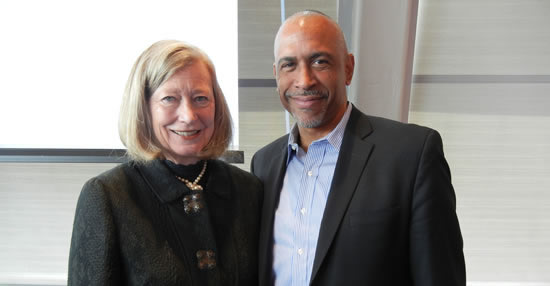What Works Best When It Comes to Education? NYU Panel Discusses Options
By Patricia Lavelle

Dean Mary Brabeck and Professor Pedro Noguera
“Do I really need to know this for the exam?” This question asked frequently by students, especially when final exams loom in the near future, reflects the current “learn to the test and teach to the test” mentality of students and teachers in today’s education climate. At the third and final installment of this year’s Education Policy Breakfast series, hosted by New York University’s Steinhardt School of Culture, Education, and Human Development, a lively panel discussion ensued over what the best testing policies are for our city, state and nation. This year’s series focused on testing, with the previous two sessions focused on the history of testing, its benefits and consequences.
The morning came alive as discussion heated up between panelists, breakfast attendees, moderator and current Peter L. Angew, Professor of Education at NYU and former chair of the board of the Oakland school district in Oakland, California, Pedro Noguera. Sitting on the panel were Ann Cook, Philip Weinberg, and Frank Worrell. Cook, the executive director of the New York Performance Standards Consortium, maintained her position of performance based evaluations in lieu of high stakes standardized testing. It is this ideal of education that is at the core of the model for the consortium of 39 New York public high schools Cook oversees. Cook expressed that Worrell, professor in the Graduate School of Education and Psychology Department at University of California, Berkley, took a difference stance on the subject at hand. Worrell spoke in defense of testing, not of any particular test, but rather, of testing as a form of useful assessment. Weinberg, an experienced New York public school teacher and administrator and now Deputy Chancellor for Teaching and Learning at the New York City Department of Education, provided the discussion within a firsthand experience within the Department of Education, although he was not able to officially comment on the department’s plans regarding testing.
In addition, Park Slope principal of P.S. 321, Elizabeth Phillips, joined the panel to discuss the recent frustrations arising from New York State’s high stakes testing and the state’s contract with Pearson. Phillips was recently published in the New York Times discussing the issues about teachers not being able to talk about the recently administered statewide. The gag order that teachers received regarding releasing test questions and instructions denies these educators the opportunity to discuss problems with the exam.
Breakfast attendees gathered in masses around the microphones placed in the audience to test the panelists on their knowledge and opinions on high risk standardized exam practices. The event could have gone into the early hours of the following morning if all questions had been asked, proving that while much has been discussed regarding education, some questions are still left unanswered. #
